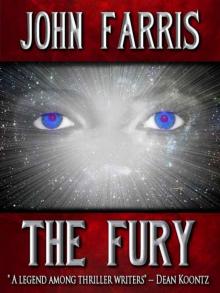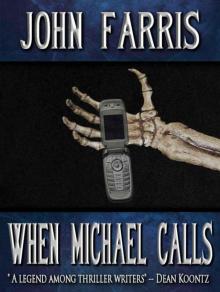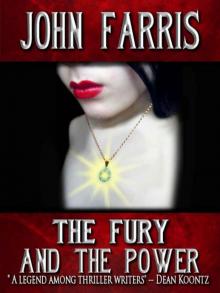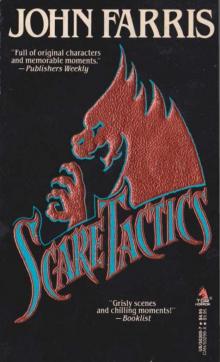- Home
- Farris, John
Sacrifice Page 2
Sacrifice Read online
Page 2
Jesse said, "I've been a neurosurgeon for fifteen years. I still don't know a hell of a lot about what goes on in here." He tapped his forehead with a finger. "I'd have an easier time explaining how Jesus walked on water. What I do know is, the brain has a lot of excess capacity, and for that we can both be damned grateful, Greg."
I wasn't grateful for the gaps in my memory: our second-honeymoon trip to Captiva, phone numbers, the recent death of a former business associate, all of it was gone. I could not recall Caroline's parents' names, the floor plan of our new house, or even what Thornhill Road looked like. For the most part, the blanks occurred in memories of the last two years. Going back much further, everything I needed or cared to recall was still intact.
Thanks to the skill of Dr. Jesse Fernando, who had been forced to invade my brain in order to save my life.
But frequently such invasions can result in a permanently lobotomized patient. As one of the residents under Jesse cheerfully explained to me, "See, if you get just a little bit of suction in the wrong place, it's like 'Oh-oh, there goes high school.' "Or college. Or the ability to remember the faces of loved ones. Or the inhibitions that enable us to function acceptably in society and which, perhaps, separate us from the beasts.
Caroline raised hell with Jesse about the unauthorized consultants; Jesse raised hell elsewhere, and, because the NO VISITORS sign was still up for all but immediate family, I had some peace. Even though I was attended by nurses around the clock, Caroline and Sharissa took turns keeping an eye on me until finally I made each of them go home to get a decent night's sleep. I could see in their eyes that they were afraid to leave, afraid that I would take a sudden turn for the worse and be gone, or in a coma, before they could get back to the hospital.
I was more concerned about them than I was for myself. Obviously I was going to be laid up for a while, months perhaps. But I'd had some luck, and I had learned a long time ago how to adjust quickly to whatever circumstances fate handed me.
"Mr. Walker? I know it's kind of late, but Dr. Fernando said it might be okay if I had a few words with you."
I thought he must be another doctor. But he was wearing a loud Madras sports jacket that looked a size too large for him, and was years out of style. He didn't have a hospital ID tag attached to a lapel.
Instead he showed me a folder with a gold badge inside.
"I'm Sergeant Butterbaugh. C.G. Butterbaugh. Sky Valley police. Say, you sure do have a lot of flowers." He hastily pulled a handkerchief from his hip pocket and caught a sneeze in time, then glanced at me in apology as tears came to his eyes. He looked around the room again. "Sorry. Any roses? Yep, thought so. Roses get me every—"
He sneezed again, lustily, jogging his eyeglasses askew on his face. The black rims contained lenses like blastproof ports. I wondered how he could see well enough to qualify for the police department, even in Sky Valley, where the crime rate was less demanding on the abilities of our officers.
"Maybe I could just set those outside while I—" He looked at me for approval.
I nodded and put down the three-pound hand weights my physical therapist had given me to work with. After four days the left hand and arm were coming around. I was also looking forward to my first walk down the hall in the morning.
Sergeant Butterbaugh carried the vase of yellow roses at arm's length to the door, stifled another sneeze, and closed the door behind him. He had the upper body of a large man and unusually short legs, a youthful face not favored by a strong chin line. His sandy hair was so fine there was probably no use in combing it; the hair just seemed to drift where it wanted to go
"The roses . . . are probably from the Kindors," I said. My voice was still hoarse and sometimes I had to think about what my next word was going to be. "Meghan raises them."
"Oh, the Kindors? Yeah, I spoke to them. He's getting rid of that Woodsman, by the way."
"Good idea, a little . . . late. I hope . . . Doyle's not being too hard on Ricky Gene."
"From what I gather, Ricky Gene's hard enough on himself. He's hardly been out of his room since it happened."
"I should give him a call," I said.
"I'll bet that'd help. Well, like I said, Mr. Walker, don't want to tire you. I'm just wrapping up my investigation of the incident, and I wanted to ask you a couple of questions." He had a lightweight though not a girlish voice, and the cadences, if not the typical highlands twang, of a North Georgia native; many of his sentences ended on an interrogative note. "Why don't I pull this chair over—"
"Sure."
Butterbaugh had a palm-size tape recorder with him. He sat beside the bed and put the recorder on the stainless-steel tray near my pillow.
"I don't think I . . . I'll be of much help to you. I know I was . . . jogging. I jog most evenings around the lake. But getting shot—that's all a blank to me."
Butterbaugh took off his glasses and cleaned them with a tissue from the box on my tray. "Sure, I understand. I was out there today and took some photographs. After talking to the kids, I've got a good idea of how the shooting happened."
"Let me in on it."
He straddled a chair, arms on the chair back. "Well, Ricky Gene and his buddies weren't very good shots to begin with. They'd pinned up a target on his shagbark hickory that grows on the crest of the rise; it sort of leans out over the path around the lake. I found seven hulls on the ground, but only one shot hit the target. The kids were standing forty-two feet away. Now, where the path you took crosses that limestone ledge, I expect you know the ledge I'm talking about—"
"Yes."
"A man your height, jogging, would be exposed from the waist up for just about three seconds as he crossed that ledge. I had one of your neighbors, Mr. Bromley, who is also six-one, run the path for me so I could be sure of that. He ran it three times at different speeds. I took my photos with a 500-millimeter lens at three different ASA levels. Photography's a hobby of mine. I've won some prizes, mostly local shows. Mr. Bromley's head was to the right and on a line from where the kids pinned their target and exactly thirty-four feet behind the tree. Given that it was twilight and the way the sun was reflecting off the lake surface, and that there was some understory in the way, I was able to conclude the kids might well not have been aware of you while Ricky Gene was potting away in the direction of his target. So that part of their story checks out, wouldn't you say?"
"You're very thorough," I said. "You made all those measurements, and—"
"Oh, yes, sir. There's a lot of ramifications to a shooting, even when, as in your case, the victim survives. And if I'm going to be in court testifying—"
"Why would you be . . . in court?" I asked him.
Sergeant Butterbaugh hesitated, and shrugged. I couldn't read his eyes; the light from my bedlamp was flaring on the lenses of his glasses.
"I'm not here as your attorney, Mr. Walker. I'm only saying that sometimes there are court proceedings, and that's one reason why my investigations are as complete as I can make them."
"It was an accident, pure and simple, and I don't—I've never given a thought to—"
He held up a hand. "You understand that it's my job only to determine if the shooting was, in fact, an accident"
"What would make you think—"
"But I don't have any preconceptions, Mr. Walker. I just met you, and I've talked to Ricky Gene twice. I guess I haven't been at my job long enough to claim any special insights into people. I have investigated a lot of shootings. I took a degree in Police Science at Cal State L.A. and I was on the force in Los Angeles for two years, until family matters brought me home to Sky Valley. I was in a "crash unit" most of the time. Seventy-seventh Division. That's South Central L.A. Juvenile gangs everywhere—Crips and Bloods. They all own guns. Kids not as old as Ricky Gene have them. MACs, Glocks, Uzis. One time I took a Desert Eagle auto away from a boy who could barely hold it level in both hands. This model was a .44 Magnum. If he ever managed to fire it, the recoil would've broken both wrists and probably di
slocated a shoulder. Matter of survival for most of them. Blood on the streets almost every night, shooting at shadows, strangers, rival homies, anybody wearing the wrong colors in the wrong place. No thought about the human consequences. What does a kid that age know about death? Or care?"
He had to stop to sneeze, smothering it in the crook of his elbow. His chubby face had a high color, a sheen of perspiration. His voice was strained, from his allergy, perhaps; or it might have been from the passion of his indignation.
"You follow, Mr. Walker?"
"I—I don't know. You mean you had the notion that Ricky Gene might've—"
Butterbaugh shrugged. "Sometimes a kid will bear grudges for reasons that aren't very clear, even to the kid himself."
"Ricky Gene isn't . . . that sort of boy, and I . . . only know him to say hello to. I've been to his house a few times. We used to be a foursome with . . . the Kindors for bridge, one Friday night a month. They're a . . . good family, Sergeant. Ricky Gene couldn't mean me any harm, and I . . . certainly don't have any ill-will toward the Kindors! It's ridiculous even to suggest . . . that Ricky Gene might have shot me on purpose."
Butterbaugh nodded, as if he were anxious to agree. He blew his nose again, then took off his glasses. I saw his eyes differently—or saw them for the first time. They were olive green in color and there was something implacable in them—the eyes of a cutthroat competitor. I also noticed the size of his hands, and the muscular thickness of one wrist—his right wrist.
"One thing you learn quickly in police work: nobody really ever knows anybody. You understand that I have to ask these questions. I wasn't making allegations."
But he had been strongly implying, and I was resentful, or perhaps defensive, because in Butterbaugh's speculation there seemed to be a buried hint of guilt on my part, as if somehow I might have been responsible for Ricky Gene shooting me. On the other hand, maybe all of us, even the law-abiding, feel defensive when someone connected with the police is asking personal questions.
I was spared further questions when Kelly Dorminy, my night nurse, came in.
Kelly was a strawberry blonde, a pretty girl with a wry mouth. She was a little on the plump side but had the nervous energy, the dash of a whippet. With my face still swollen and bruised, I didn't think she could have detected any displeasure in my expression. But after one glance at me she turned to Butterbaugh and said, cheerful but firm, "That'll have to be all for tonight. Old Ironhead needs his rest." That was my nickname on the floor. I had become a little vain about it.
"Sure." Butterbaugh scraped his chair back. "Thanks, Mr. Walker. I guess this wraps it up for me." He retrieved his miniature recorder and shut it off. I felt a measure of relief as he prepared to leave.
"Do you play a lot of tennis?" I asked him, just to be saying something cordial.
"Sir . . . ? As a matter of fact, I do. How—?" He pocketed the minicorder, gave his strong right wrist a half turn and laughed. "You ought to be a detective yourself."
"My daughter started playing when she was six. She was the third-ranked G.S.T.A. junior girl a couple of years ago. Her left arm was weak, so she did special exercises to build up the muscles."
"That's Sharissa? Beautiful name. We had a nice chat yesterday when I dropped by to see how you were coming along. Sharissa told me she was doing an Advanced Placement paper on Forensic Science. Seems like a very bright girl."
"Top five percent of her graduating class. We're real proud of Sharissa."
"Now that really must be all," Kelly said to Butterbaugh, "and you have no idea how ugly I can be when I'm not minded."
"You? Nah." Butterbaugh smiled and was nearly out the door when he hesitated and snapped his fingers. "Almost forgot. Mr. Walker, tell Sharissa I'll drop off those books she wanted in a day or two."
"Out," Kelly Dorminy said, and she closed the door in Butterbaugh's face before I had a chance to ask him what books he was talking about.
After that, Kelly checked all the medications I was receiving through tubes in my wrist and right foot, and took my temperature. The fever was coming down, slowly. Their biggest worry, Dr. Fernando had told my wile, was an inflammation of the brain, for any number of reasons, or the sudden onset of meningitis, which would be fatal quickly in my present condition.
"Don't let on to anybody that I told you," Kelly said, "but you're scheduled for some major-league visitors tomorrow: neurosurgeons from the AMA convention they're holding down there in Atlanta."
"I can hardly wait."
"Big day for you. The catheter's coming out, and so's that pipeline into your foot."
"Good. It's been itching like crazy."
"Want me to scratch?"
"Yes."
She scratched the sole of my foot for me, a teasing smile on her face. Or that's what I thought I saw. "How's that feel?"
"Feels fine," I said. "Kelly, honey, you know what? I've had me a hell of a hard-on since you walked in the room. Why don't we just take the catheter out tonight, and then you can suck Old Ironhead off big-time."
Kelly stiffened in shock; then the light went out of her pretty green eyes and they seemed suddenly vitrified. She turned away from the bed as if she had just slammed a door.
"I'll be back in a little while," she said.
"Kelly!"
"Yes?"
"God—I don't know what made me —I don't know where that came from! I never use that kind of—that was somebody else talking, Kelly!"
She hesitated, then her shoulders drooped and she turned with a slightly bitter smile.
"Never mind. I didn't hear it. Would you like the TV on?"
"Yes. Okay." I was still mortified. "Please, Kelly. I'm really very—"
"No need to apologize, Mr. Walker, You just kind of zinged me there—I was surprised, but I shouldn't have been. Dr. Fernando and Dr. Kiddfield explained to all of us who are on this service that—well—there could be some sudden changes in your behavior."
"Explain it to me."
"It has to do with the frontal lobes being—disturbed. Patients with wounds like yours sometimes speak and act in a manner contrary to their normal personalities. In the worst cases—and you're certainly not the worst head trauma case we've had, don't get that idea—patients will say or do anything that pops into their minds."
"Or may have been there all along?"
"Mr. Walker, it was just a—didn't mean anything, really. I get worse stuff all the time from some of the residents around here, believe me." Kelly put the TV remote control near my right hand, fussed with my pillow to prove that I had been forgiven. "News, or the HBO movie?"
The HBO movie was a rerun of Robocop.
"Just turn it off," I said, "I guess I don't feel like watching anything right now."
That night the old Timekeeper was back in my dreams, as was the pyramid.
There were strange-looking birds the color of the sky flying over the white, step-terraced pyramid. Something was crouched on the roof of the structure that capped the pyramid—something huge, animal-like, and forbidding. But I was far away, I couldn't make it out. The Timekeeper in his severe black suit beckoned me closer. I walked slowly across a deserted, stone-paved plaza toward the Timekeeper. It was night before I reached him, a night of drumming and the brilliance of stars. There was torchlight in the black pupils of his eyes.
"Father?" I said. He smiled at me. "Now?" I asked him.
He opened a hand that was caked with old blood. The gold pocket watch in his palm had no hands. Instead of ticking it made a windy, moaning sound, like a bull-roarer gathering velocity. He looked from my face to the top of the pyramid. I was to climb up there. I had known that all along, but I couldn't make myself ascend the seven steep levels to acknowledge the fate that was waiting for me.
I turned back to the Timekeeper. Where his head had been a harpy eagle sat clutching his shoulders, glaring at me with yellow eyes.
The next day in the hospital was, emotionally, my worst, although my spirits should have been mu
ch improved by getting out of bed and limping around for short periods of time. I had made up my mind that I was ready to go home; Jesse Fernando had other ideas.
Three eminent neurosurgeons took time out from the convention they were attending and helicoptered up from Atlanta to review my case and talk with me. Jesse didn't come right out and say so, but it was obvious he hoped I'd make the effort to cooperate with them. I tried, but I was getting fed up with all the attention. I wanted to put the shooting behind me, go home to my family and get on with my life as soon as possible.
The eldest of the neurosurgeons, a man with buzz-cut white hair and the ruddy complexion of a construction foreman, said, "I was a battalion surgeon in Vietnam for three years. I'm confident I've seen almost everything, including one soldier who came back from the dead as they were about to prepare him for burial. But the adaptive and recovery powers of your brain is unique in my experience."
"What about the bullet fragments?" I looked at the eminent neurosurgeon from Lyon, a man named Duvivier. "Vont ils mé causer des problems plutard?"
He nodded and smiled approval of my French, which I was glad to learn hadn't gone down the drain with fragments of brain tissue.
"This is most difficult to say. Dr. Fernando did excellent work in recovering the majority of the fragments. But it was not worth the risk of trying to remove all of them."
"Greg's forty-five," Jesse said. "But he has the constitution of a man twenty years younger. That may be a factor in his recovery time."
"I've always tried to take care of myself. Most of my life I've worked two jobs. I always like to say, I'm too busy to get sick." I chuckled and they smiled, but I still didn't care for the way they were looking at me. As if I were an insult to their education and experience. "This is the first time I've been in a hospital since my daughter was born. I hope it'll be the last."
The Reverend Bob Justival had a little different slant on my narrow escape.
"It's a miracle, Greg!" Bob said, or rather, exulted; he has that bully, holy look of the fatted friars of old. His fervent style can wear you down after a while. Most parishioners of First Iconium refer to his wife Beth Ann as "shy," but to me she looks sort of stunned most of the time. "Jesus heard your prayers, good buddy."

 Sacrifice
Sacrifice Wildwood
Wildwood Fury
Fury Captors
Captors When Michael Calls
When Michael Calls Fury and the Power
Fury and the Power Dragonfly
Dragonfly Scare Tactics
Scare Tactics